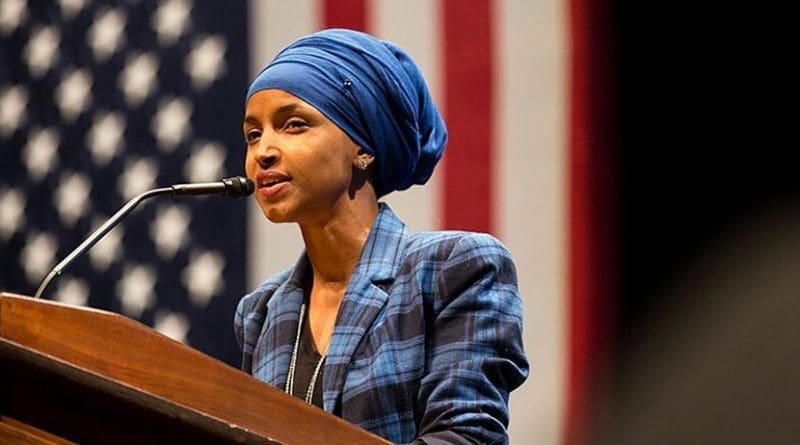Trump Doubles Down On Omar, Tlaib Criticism – OpEd
By Arab News
By Osama Al-Sharif*
There is no precedent for what US President Donald Trump and Israeli Prime Minister Benjamin Netanyahu did last week. A sitting US president called on Israel, a close ally, to bar two Muslim congresswomen from entering the country — and the Israeli premier caved in.
Reps. Ilhan Omar and Rashida Tlaib and their Democratic Party have become the target of almost daily Trump Twitter tirades. Somali-born Omar and Tlaib, the daughter of Palestinian immigrants, are two of a four-member informal group of elected Democrats known as “The Squad.” Demonizing his opponents and appealing to his hardcore base, Trump accused the two congresswomen of being anti-Semitic. He tweeted last week that, if they were allowed to visit Israel, it would show “great weakness.” After initially saying that the two women would be allowed to visit, Netanyahu reversed his position and defended the decision to bar them over their support for the BDS (Boycott, Divestment and Sanctions) movement, which aims to punish Israel for its occupation of Palestinian territories.
Trump’s actions and Netanyahu’s response have backfired, eliciting denunciations from Republican and Democratic politicians alike, as well as Jewish organizations, including the influential American Israel Public Affairs Committee. The outcry has actually focused public attention on BDS and Israel’s treatment of Palestinians under occupation. Netanyahu’s rivals accused him of bowing to Trump and of threatening Israel’s standing in the US Congress.
Tlaib and Omar, who are strong critics of Trump and Israel, have enjoyed unprecedented support from Jewish organizations in the US as well as media publicity. The White House has rejected reports that Trump pressured Israel to deny them entry, but a number of media outlets have confirmed that the US president told advisers that Israel should not allow the two congresswomen to enter.
Aside from this dangerous precedent, the case has focused attention on Trump’s unorthodox and polarizing politics as he prepares to launch his campaign for re-election in 2020. As Trump often does, he doubled down on his criticism, describing Omar and Tlaib as the faces of the Democratic Party, which he now labels as promoting a “communist and socialist” agenda.
For Netanyahu, who is facing a battle for political survival in an unpredictable election in September, bowing to Trump’s request could be the prelude for a quid pro quo. He has asked the US president to approve a controversial move to annex Jewish settlements in the West Bank, which would appease thousands of far-right voters. Trump has already sanctioned the illegal annexation of the occupied Golan Heights, recognized Jerusalem as the Israeli capital and relocated the US Embassy from Tel Aviv.
For now, Tlaib and Omar appear to have won the public opinion battle. While Congress recently approved a law that delegitimizes BDS, it continues to support the two-state solution. These congresswomen have not called for the destruction of Israel, but the controversy has focused attention on Israel’s occupation and its brutal treatment of Palestinians. Far-right Israeli lawmakers even wrote to the US Congress last week, describing support of the two-state solution as more dangerous to Tel Aviv than the BDS movement.
But, away from the Omar-Tlaib controversy, Trump’s behavior has deepened the rifts that now characterize US politics. Since he first launched his campaign for the presidency in 2015, Trump has been keen to prove that he is not a conventional politician. Resorting to fiery populist rhetoric to mobilize his mostly white, right-leaning voter base, the billionaire candidate was able to rattle and dislodge mainstream politicians. Fanning anti-immigrant and anti-Muslim sentiments, Trump was able to do something that no candidate before him had dared to do: Normalize hate speech.
Since then, it has become the norm to greet the day with a barrage of Trump tweets. He uses derogatory terms to describe his Democratic opponents and is seemingly unperturbed that some of these tweets are provocative and misleading. The mainstream media, which Trump dismisses as “fake news,” spends the day fact-checking the president — and proving him wrong on many issues.
Regardless of the outcome of the presidential election next year, the big question is will the US ever recover from the polarizing effect of Trump’s politics? The way he has treated his opponents, most recently Tlaib, Omar and the other members of “The Squad,” suggests his populist, nationalist rhetoric — as divisive as it is — now has a faithful voter base. Bashing opponents based on their ethnicity, religion and political beliefs will take a long time to wipe out from US politics.
- Osama Al-Sharif is a journalist and political commentator based in Amman. Twitter: @plato010

